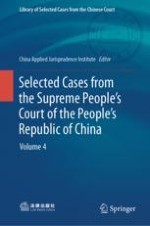2023 | Buch
Selected Cases from the Supreme People’s Court of the People’s Republic of China
Volume 4
herausgegeben von: China Applied Jurisprudence Institute
Verlag: Springer Nature Singapore
Buchreihe : Library of Selected Cases from the Chinese Court
